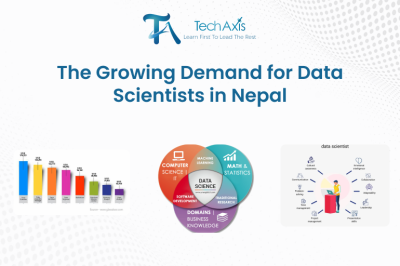
The Growing Demand for Data Scientists in Nepal
Today, data-smart approaches are helping to achieve incredible successes including the ability to use analytical prediction in the tourism industry in Nepal to improve customer satisfaction and to manage resources more efficiently. Such illustrations have presented a clear picture of how businesses and sectors in the country can benefit from data science insights. Therefore, employment opportunities for data scientists are becoming more plentiful very quickly in Nepal as more organizations experience the value of data in decision-making and development.
During this shift particular industries are most affected and those include finance, health, agriculture and e-commerce since these industries need a workforce who will analyze data to solve problems, increase productivity and gain a competitive edge. The continuous digital change in Nepal is also increasing the rate of this progression as organizations look for data scientists who can analyze the raw data to make strategic business decisions. This increased demand for data science skills is not only seen in the corporate world and business but it’s also availing policy decision-making, development initiatives, and non-profit organization frameworks. With the increasing demand for data-based approaches, data scientists are now valuable assets to the development of the country and different sectors of society.
The Role of Data Science in Modern Nepal
- Data-Driven Decision Making: Through using data science, it has been noted that data-driven decisions in Nepal's administrative and business industries are being customized. Data has become a critical tool that organizations harness to support their direction, processes, as well as clients. For example, payment solution firms such as eSewa have benefitted from data analytics in augmenting their payment portfolio to enhance the experience of every client. Likewise, the Nepalese government has launched some projects including data analysis to identify the needs of the public and then distribute the resources appropriately. A good example is the application of data in the transportation of essential commodities during the recent COVID-19 crisis, which greatly reduced costs and extravagance. The following cases demonstrate how the utilization of big data for decision-making enables organizations and government institutions to make proper decisions that enhance results.
- Innovation and Economic Growth: Today, the role of data science is fundamental in enhancing the creation of new solutions and the development of the economy in the changing country of Nepal. With the help of market characteristics, further techniques of consumer needs satisfaction are being created by producing more appealing products and services. For instance, some companies such as Daraz have implemented data analytics in their local e-commerce start-ups to improve their facility by providing customized solutions for shopping and effective control of stock. Moreover, there are new innovative technologies that are arising in industries such as agriculture to allow the farmer to make the right crop decisions and increase yields. The integration of data science in various sectors is accrediting efficiency and at the same time is a boost in the development of the economy since various jobs are created, and the culture of innovation is encouraged.
- Addressing Social Challenges: Data science can be very impactful in dealing with some of the major social issues among them being poverty, health and education in Nepal. With quantitative and qualitative solutions, organizations can pinpoint vulnerable citizens and invest appropriately. For instance, there is data analytics that has been used in healthcare where the spread of diseases has been better than before hence decreasing the number of people who will die due to diseases’ outcomes. In the learning education sectors data analytics has been used to discover chasms of functionality in faculties and has been used to reform education to give improved results. There are also programs which are based on data for the evaluation of poverty and the aim of helping the needy community. The examples from this work demonstrate that data science can be the key enabler in addressing major social challenges and fostering sustainable development.
The Current State of Data Science in Nepal
- Educational Institutions and Programs: With the growing market demand for data science professionals the educational institutes in Nepal are changing their landscape at a very high pace. Changed expectations have seen universities and colleges across the country launching programs in data science that in most cases blend statistics, computer science and subject expertise. Many universities in Nepal including Tribhuvan University and Kathmandu University have master's courses dealing with data analysis. Some IT Training institutes like TechAxis have practical and beginner to advanced Data Science Training courses. Though, there are Universities that provide relevant and good quality knowledge on data science while there are other Universities that do not. Some programs are quite strong and well-developed to meet the market demand, while others may not be well supported or staffed with qualified faculties, arguing for constant refinement and collaboration with industry outsiders to improve educational supply.
- Industry Adoption of Data Science: In sectors of Nepal, a few areas are pushing for industry adoption of data science with finance, telecom, and health sectors most forward. Thus, today financial institutions apply data analytics for fraud detection, credit scoring and customer segmentation to increase their operational efficiency and service delivery. Within the telecom sector, data science is being used for customer behaviour patterns, network performance, and customer satisfaction mapping. In the same way, healthcare organizations are utilizing data analytics to advance the patients’ care and distribution of assets. the shortage of qualified employees, the problem of staff training, and the problem of capital capital-intensive nature of equipment and technology. Still, data science has brought opportunities to create grand values in almost all spheres of business ventures across the globe and many opportunities exist to grow and innovate the Nepalese market.
Future Trends and Opportunities
- Emerging Technologies and Data Science: As mentioned above by the technology boom in terms of Artificial intelligence (AI), Internet of Things (IoT) and cloud computing the arena of data science has been changed dramatically. These technologies are not only improving the methods of data collection and data processing but also enabling the more complex analysis of models. For instance, they comprise big data that can be processed at far greater speed and provide significant intelligence for developing business tactics and solving complex problems. IoT creates a huge amount of data in real time, and this data represents the potential for bettering business operations and interactions with customers.
But these technologies are evolving at very high rates and in the process creating questions like the privacy and security of data. More and more organizations are adopting cloud computing solutions for storage and analysis of their data and to enhance their competitiveness, various challenges crop up like Data Protection and Compliance and Multi-Cloud Management. In summary, the use of emerging technologies in combination with bigger data science has many application potentials but exciting challenges for improving the innovation and efficiency of extreme technologies. - Skills Gap and Talent Development: Due to these reasons and the increased demand for data science specialists in Nepal, there is still a gap which limits the application of data science interventions. Most graduate students have a lot of theories they have been taught in class, but they don’t have the actual skills needed to apply such theories. This is especially due to the change that is continuously being experienced in technology that necessitates the need to learn. To this end, several measures are being taken to build data science capabilities. Schools are in demand involving companies to provide internships, workshops or real projects that will allow the students to gain employability skills.
Furthermore, emerging training organizations such as TechAxis and other training institutions are now developing and offering practical training programs that can assist learners in mastering the related tools and knowledge held in the operation of the field. Internet sources are also proving to be effective sources of continuous personal development, with numerous course offerings of different difficulties and levels. This will enable the full potential of data science to be harnessed for the development of industries in Nepal through training and development of talents and filling the skills gap. - Government Support and Policies: The government’s responsibility for the further development of data science and innovations in Nepal has been appreciated more and more as the key to the development of the country’s technologies. The government and its various agencies are slowly realizing the relevance of utilizing statistics in policy formulation and the development of strategies for economic growth. To encourage data science development, the government has embarked on several activities that would enhance the growth of the right environment for innovation. These are grants to tech start-ups, research funding in big data and partnering with learning institutions to offer programs that meet the market demands for data scientists.
Further, it is important to note that data science and innovation centres can also act as platforms to support improvements in interaction and collaboration between business, academia and government. They are necessary to build the kind of healthy, competitive market for data that can attract capital and relevant human capital. In light of the ongoing efforts of the government towards formulation and enactment of such policies, the role of data science in Nepal to promote the growth of the economy and the society and the quality of public services will be boosted tremendously.
Conclusion
In conclusion, the growth of data science in Nepal is generalising with the winding need for highly qualified staff, the implementation of novel technologies, and universities along with pertinent organisations in the government sector. In this work, it is considered that data science is driving changes to decision-making processes in different industries, helps to grow the economy, and solves relevant social issues. However, there are still main barriers, for example, gaps in skills which can be addressed only through a focused talent management approach.
After analysing the current and future state of data science in Nepal, the application shows a bright future and a world full of growth opportunities. ICT integration including the adoption of artificial intelligence, the internet of things and cloud computing would enhance the competitiveness of Nepalese products in the global market.
Those who are in civil society and organizations, need to embrace data science to be the key towards decision-making and sustainable development. As a result, I urge you to seek out relevant data science education, cross-pollinate with other markets, and incorporate data science into your planning processes. On our hand, with data science, achieving while learning growth and development can be a reality in the ever-changing Nepalese context.











